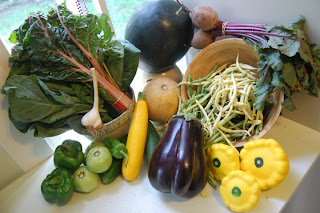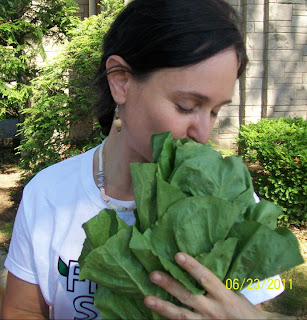What does it take to rebuild a just and thriving local food system in Kentucky, one that helps ensure that everyone, regardless of race, income, or neighborhood of residence has access to good, clean, fair, affordable food? This question has been the passion of New Roots since its formation in 2009, and has led to our mission to create a just and thriving food system in the Louisville metro area.
New Roots is a small, grassroots 501 (c)(3) nonprofit organization. I founded it with the help of my young daughter Cicada Hoyt, and much love and support from other community members. Today, this small nonprofit is catching the attention of people all over the world for its “can-do” attitude and effective work in connecting low-income residents of Louisville’s “food deserts” (West Louisville, Newburg, and Old Louisville, for now) with affordable fresh food from local and regional farmers on a shoestring budget. New Roots accomplishes this through its innovative Fresh Stop Projects, food justice leadership development classes, and healthy eating “boot camps.”
The formation of New Roots grew out of a frustration with the lack of farmers’ markets in Louisville’s food deserts. Louisville presently has 27 farmers’ markets, yet very few exist in the neighborhoods that need them most. Farmers Markets in the food deserts have been impossible to sustain. Farmers have the perception that they will make more money in high-income neighborhood farmers’ markets, and often fear for their safety in “high crime areas.” In addition, farmers’ markets pricing, even if Food Stamps/EBT are accepted, is often too high for low-income families. Grocery store chains share these perceptions. This phenomenon has led to a disparity in health. Residents of these neighborhoods experience higher rates of diet-related illnesses than people who live outside of them.
About seven years ago, an alternative vision for food justice—The Fresh Stop Project— was brewing in Cleveland, Ohio with City Fresh. Fresh Stops are similar to CSAs, Community-Supported Agriculture projects. A typical farmer-run CSA works by asking members to pay a large fee up front, before the Kentucky growing season (average of about $600 in our region). In turn, the members receive weekly baskets full of fresh, seasonal produce from the farm. However, low-income families cannot usually afford a large up front fee.
Fresh Stops run either every week or every week, and payment is given only one week ahead of time, so the upfront commitment is doable. Some Fresh Stops run on a sliding scale—with low income food stamp users paying $12 per share and higher income paying $25—so that neighbors are subsidizing good food for their neighbors, and in turn the collective buying power allows the group to purchase much more than they could have otherwise.
Fresh Stops are run and operated by community and church leaders and are 100% volunteer-powered and not-for-profit. This past May, interested neighborhood leaders were recruited and invited to spend seven weeks (one hour class per week) participating in New Root’s food justice leadership development class to explore a Shawnee Neighborhood Fresh Stop. We engaged in often difficult conversations about food justice, including the role race plays in why low-income residents of color have limited options for fresh food access, yet are inundated with fast food, and what we call, “The Color of the Local Food System,” i.e., the fact that our nation’s food system is controlled by mostly wealthy Caucasians. Twenty-five leaders visited Courtney farms, and listened to owner Mary Courtney talk about what it takes for a small family farmer to survive in this economy, allowing a deep connection to emerge between growers and eaters. We talked about the effects of agricultural chemicals on our health and the health of workers, and the role of federal policy in the rise of high-fructose corn syrup flavored processed foods, and corn in the diets of factory-farmed animals. At the end of the seven weeks, the leaders organized themselves into teams to plan the new Fresh Stop.
The Fresh Stop uses a cooperative buying model to buy fresh local food at wholesale prices from a variety of farmers who understand our mission and are happy to participate, sometimes donating extras. During the winter, neighborhood leaders meet with farmers to ask them to grow specific produce that meets the needs of the community and negotiating wholesale prices. This same Farmer Liaison Team continues to work with the farmers throughout the season, checking on what is in season and current pricing, and placing orders. A week before the Fresh Stop, Fresh Stop Coordinators and the Outreach Team remind families to pay for their shares. All money is collected, orders are tallied, farmers are called, and orders are placed. One Fresh Stop can have four farmers participating in one event.
New Roots has to date chosen to partner with churches and community centers for Fresh Stop locations. We have been very lucky to partner with Fourth Avenue United Methodist Church in Old Louisville (now in its fourth season and operating independently with some shared produce buying), the Wesley House in Newburg, and the Redeemer Lutheran Church and the Shawnee Arts and Cultural Center in West Louisville.
On the day of the Fresh Stop, farmers drop off their produce at the site. Volunteers immediately get to the task of counting to figure out how many of each item a family can receive. Tables are set up and items are displayed. Volunteers are stationed behind the produce tables to answer questions on preparation and storage of produce and to offer other tips.
When you show up at a Fresh Stop, members of your community greet you. Our Fresh Stop Coordinators Team checks off your name to verify that you have paid ahead of time or have your EBT/Food Stamp card swiped, and then you are given a reusable bag to go down a line of tables full of beautiful local produce. Signs on the table tell members how many of each item they can choose, giving the Fresh Stop the feel of a farmers’ market. In Shawnee we are lucky to have Chef Derrick Jackson there every week demonstrating how to prepare the items in the week’s share. A newsletter is available with recipes and stories on people’s relationship to food. Then, members are asked if they would like to share in the next Fresh Stop’s bounty and money is collected. Any extras are sold on a separate table and money is rolled back into the Fresh Stop. Volunteers clean up and the site rests, until the next Fresh Stop. The Shawnee Fresh Stop leadership team meets biweekly to share best practices with each other and continually improve the process, do neighborhood canvassing, and introduce new food justice concepts to the group.
A Fresh Stop has a lot of “moving parts.” To see it in action, it looks like everything happens as if by magic, but actually, it has taken a group of dedicated volunteer leaders organized into teams to make it work. To date, over 300 families have participated in the Shawnee Fresh Stop, an average of 50 per week in Old Louisville, and 25 families at the Wesley House.
New Roots is presently looking for new board members to help us meet this great need in the community, with terms to begin in mid-September. We also need your donation to create a network of Fresh Stops all over the City. Please call 502-509- 6770 or email info@newrootsproduce.org. Visit our Facebook site at www.facebook.com/newroots and our website at www.newrootsproduce.org.
The author shows her appreciation of Kentucky-grown Romaine Lettuce


See Awesome New Fresh Model picture Click HERE
ReplyDeleteSee Awesome New Fresh Model Sexy picture Click HERE
See Awesome New Fresh Model Hot & Sexy picture Click HERE
watch free all adult tv channels
watch latest hollywood movies in english
watch latest hollywood movies in english
watch free all latest bollywood movies
watch free all adult tv channels
watch latest hollywood movies in english
watch free all latest bollywood movies